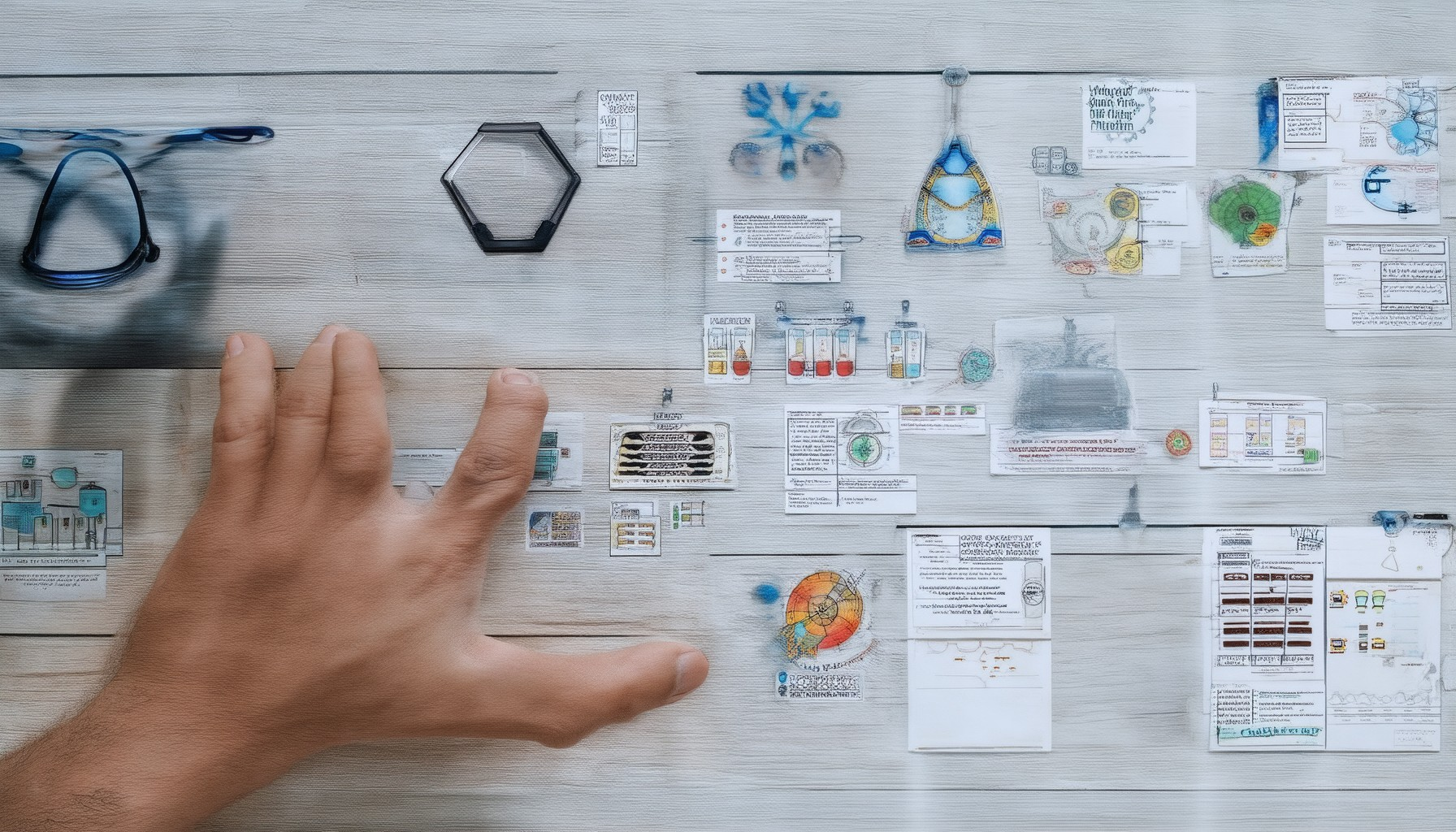Embarking on a journey of self-discovery and growth is a transformative experience that can lead to unprecedented levels of success and fulfillment. In today’s fast-paced world, personal growth has become a cornerstone of professional and personal development, offering individuals the tools they need to unlock their full potential. Whether you’re seeking to enhance self-growth, overcome obstacles, or simply improve yourself daily, understanding the stages of personal development is crucial. This guide delves into the intricate process of personal growth, exploring the key stages, essential strategies, and actionable tips that can help you navigate your journey effectively. From mastering the 4 P’s of personal development to embracing self-improvement habits, this comprehensive exploration will provide you with the insights and guidance needed to embark on a path toward continuous improvement and lasting change.
Improving Personal Growth: A Strategic Approach
To embark on a journey of personal growth, it’s essential to approach it methodically and thoughtfully. Here’s a structured plan based on key insights and actionable steps:
1. Set Clear, Measurable Goals
Define specific objectives that align with your values and aspirations. Whether it’s running a marathon or mastering a new skill, having clear goals provides direction and motivation. Reflect regularly on your progress to stay aligned with your targets.
2. Cultivate Self-Awareness
Understand yourself deeply through journaling or reflection. Allocate time daily to document your thoughts and emotions, gaining insights that guide your growth journey.
3. Pursue Continuous Learning
Expand your knowledge and skills by learning new languages, cooking, or other hobbies. Dedicate a manageable amount of time each day to explore these areas, balancing them with other commitments.
4. Develop Healthy Habits
Build positive habits incrementally. Start with small changes like flossing daily and gradually incorporate others. Embrace setbacks as learning opportunities rather than failures.
5. Strengthen Relationships
Nurture supportive friendships and mentorships. Schedule regular interactions and engage in meaningful conversations. Seek out communities online or offline where individuals share similar goals for added encouragement.
6. Adopt a Growth Mindset
Become resilient by viewing challenges as growth opportunities. Celebrate achievements and reframe failures as stepping stones toward success.
7. Practice Gratitude
Maintain a gratitude journal by dedicating time each evening to note positives in your life. This habit fosters mindfulness and appreciation of your current circumstances.
8. Limit Negative Influences
Set boundaries with negative individuals to protect your mindset. Discuss your goals and aspirations with them to demonstrate your commitment to personal growth.
9. Explore New Interests
Engage in hobbies like photography or cooking. Allocate specific weekly hours to pursue these interests, ensuring they fit within your schedule without overwhelming you.
10. Embrace Vulnerability
Share your struggles with trusted friends or therapists to foster openness. Practice honest communication in your relationships to build deeper connections.
11. Prioritize Physical Health
Essential for overall well-being, prioritize exercise, adequate sleep, and nutritious meals. Create a sleep routine and incorporate more fruits and vegetables into your diet. Regular walks can enhance energy levels.
By integrating these strategies into a structured plan, you can track your progress and remain motivated, fostering sustainable personal growth over time.
Personal Improvement Plans: A Comprehensive Guide
Creating a personalized improvement plan is essential for fostering growth and achieving your full potential. Below are seven effective strategies to help you stay focused and motivated:
1. Self-Assessment
Understanding your strengths and weaknesses is the foundation of any successful improvement plan. Take time to reflect on your current state and identify areas where you can grow. Tools like personality assessments or skill gap analyses can provide valuable insights.
2. Goal Setting
Set clear, measurable objectives that align with your aspirations. Break larger goals into smaller, manageable tasks. For example, if your goal is to learn a new language, create a weekly study schedule or join online courses recommended by platforms like Chris and One.
3. Identify Development Areas
Focus on specific areas that need improvement. Whether it’s enhancing communication skills, developing better time management habits, or building stronger relationships, pinpointing these gaps will guide your efforts.
4. Create an Action Plan
Develop a structured plan with timelines and milestones. Prioritize tasks based on urgency and impact. Utilize resources from Chris and One to access guides, templates, and workshops that can assist in executing your plan effectively.
5. Track Progress
Monitoring your progress is crucial for staying on track. Use apps, journals, or dashboards to record achievements and challenges. Adjust your strategy as needed to overcome obstacles and maintain momentum.
6. Seek Feedback
Regularly seek input from mentors, peers, or friends to gain unbiased perspectives. Platforms like Chris and One often provide forums or expert advice sections where you can share experiences and receive constructive criticism.
7. Reflect and Adapt
At the end of each month or quarter, take time to reflect on your progress. Assess what worked well, what didn’t, and what adjustments you can make moving forward. This reflection phase will help you stay aligned with your long-term goals.
By implementing these strategies, you can create a personalized roadmap that leads to lasting growth and success. Visit Chris and One to explore tailored resources and tools designed to support your journey.
How Can I Grow Up Myself?
Personal growth is a lifelong journey that requires intentional effort and dedication. Below are 15 actionable steps to help you embark on your journey toward self-improvement:
- Set Clear Goals
- Define your short-term and long-term objectives.
- Break them down into manageable tasks and timelines.
- Use goal-setting tools or apps to track progress.
- Develop a Growth Mindset
- Embrace challenges as opportunities for learning and growth.
- Become open to feedback and willing to adapt.
- View failure as a stepping stone to success.
- Continuous Learning
- Allocate time daily for reading, courses, or workshops.
- Explore diverse fields to broaden your perspective.
- Stay updated with industry trends and knowledge.
- Practice Gratitude
- Start a gratitude journal to reflect on daily positives.
- Appreciate small victories and recognize progress.
- Cultivate mindfulness through meditation or reflection.
- Build Strong Relationships
- Nurture connections with supportive friends and mentors.
- Seek advice and guidance from trusted individuals.
- Practice active listening and empathy in interactions.
- Health and Wellness
- Prioritize physical health through exercise and nutrition.
- Get adequate sleep to recharge energy levels.
- Maintain a balanced mental state through relaxation techniques.
- Identify Strengths and Weaknesses
- Conduct self-assessments to understand your abilities.
- Create an improvement plan for areas needing growth.
- Leverage strengths to overcome weaknesses.
- Stay Curious and Explore New Interests
- Approach life with curiosity and enthusiasm.
- Discover hobbies or passions that bring joy and fulfillment.
- Engage in activities that stimulate intellectual growth.
- Be Accountable and Reflective
- Review achievements and setbacks regularly.
- Hold yourself accountable for commitments made.
- Learn from past experiences to inform future actions.
- Network and Collaborate
- Connect with peers who share similar goals and interests.
- Collaborate on projects to gain new skills and insights.
- Join online communities or local groups for support.
- Adopt a Positive Outlook
- Choose to see challenges as temporary obstacles.
- Focus on solutions rather than problems.
- Surround yourself with uplifting and supportive environments.
- Document Progress
- Keep a record of your personal development milestones.
- Track changes in habits, skills, and mindset.
- Celebrate achievements to boost confidence and motivation.
- Prioritize Personal Time
- Carve out time for self-care and personal reflection.
- Engage in activities that bring you joy and fulfillment.
- Use downtime to recharge and rejuvenate.
- Seek Feedback Regularly
- Ask for input from trusted friends, family, or mentors.
- Use feedback to identify areas for improvement.
- Implement suggestions to enhance personal effectiveness.
- Stay Persistent and Patient
- Understand that growth takes time and consistent effort.
- Stay committed despite challenges and setbacks.
- Persist in pursuing long-term goals and aspirations.
- Continuously Improve
- Regularly assess and update your personal development strategy.
- Adapt to changing circumstances and new opportunities.
- Seek out resources and tools to enhance your growth journey.
What Are the 4 Stages of Personal Growth?
Understanding the journey of personal growth involves recognizing and navigating through distinct phases that contribute to self-improvement and development. Here’s a breakdown of the four primary stages:
1. Self-Awareness
The foundation of personal growth begins with self-awareness. This stage involves understanding your strengths, weaknesses, values, and aspirations. Without knowing who you are, it’s challenging to grow meaningfully.
- Identifying personality traits and core beliefs.
- Evaluating past experiences and learning from mistakes.
- Setting personal goals aligned with your true self.
2. Exploration
Once you’ve gained self-awareness, the next phase is exploration. This is where you experiment with new ideas, habits, and perspectives to expand your horizons.
- Trying new activities and discovering hidden talents.
- Learning from others’ experiences and approaches.
- Developing a growth mindset to embrace challenges.
3. Expansion
Expansion is about building upon the knowledge and skills acquired during the exploration phase. This stage focuses on developing competencies and capabilities that support long-term success.
- Mastering practical skills and expertise.
- Broadening your network and relationships.
- Applying theoretical knowledge to real-world situations.
4. Expression
Finally, expression allows you to share your growth with the world. This stage is about leveraging your newfound abilities to create impact and inspire others.
- Communicating your vision and ideas effectively.
- Leading by example and influencing others positively.
- Pursuing passions and contributing to meaningful projects.
At Chris and One, we specialize in guiding you through every stage of personal growth. From self-awareness to expression, our resources and tools are designed to empower you to become the best version of yourself. Explore our self-improvement tips and relationship advice to support your journey today!
What Are the 4 Stages of Growth?
The 4 stages of growth refer to the sequential development phases through which individuals progress as they mature emotionally, mentally, and socially. These stages provide a framework to understand how people grow and develop over time.
- Stage 1: Exploration and Discovery
- In this stage, individuals begin to explore the world around them, developing curiosity and a sense of wonder. They discover their interests, strengths, and weaknesses, which lay the foundation for future growth.
-
Stage 2: Formation of Identity
- As individuals move through this stage, they start to define their sense of self. This involves understanding their values, beliefs, and goals, helping them establish a clear identity and purpose in life.
-
Stage 3: Integration and Balance
- During this phase, individuals work on balancing various aspects of their lives. They learn to manage emotions, build healthy relationships, and make decisions that align with their values, fostering a sense of harmony and fulfillment.
-
Stage 4: Actualization and Fulfillment
- Finally, individuals aim for actualization, striving to fulfill their potential and live authentically. This stage is marked by a sense of completeness and satisfaction, often achieved through pursuing passions, contributing to others, and finding meaning in life.
By navigating these stages, individuals can achieve greater self-awareness, emotional resilience, and a deeper understanding of their place in the world.
What Are the 4 Ps of Personal Development?
The 4 Ps of personal development are a powerful framework to guide individuals toward self-improvement and growth. These Ps stand for:
- Purpose : Understanding your core values and objectives is the foundation of personal development. Without a clear purpose, it’s challenging to stay motivated or measure progress.
- Passion : Aligning your actions with what you truly enjoy helps sustain long-term interest and effort in your growth journey.
- Potential : Discovering and leveraging your unique strengths, talents, and opportunities is essential for unlocking your full potential.
- Persistence : Consistent effort and dedication are crucial to overcoming challenges and achieving your goals.
Each element plays a vital role in shaping who you become. By focusing on these Ps, you can create a balanced and fulfilling personal development strategy that aligns with your aspirations and contributes positively to your life.









0 Comments